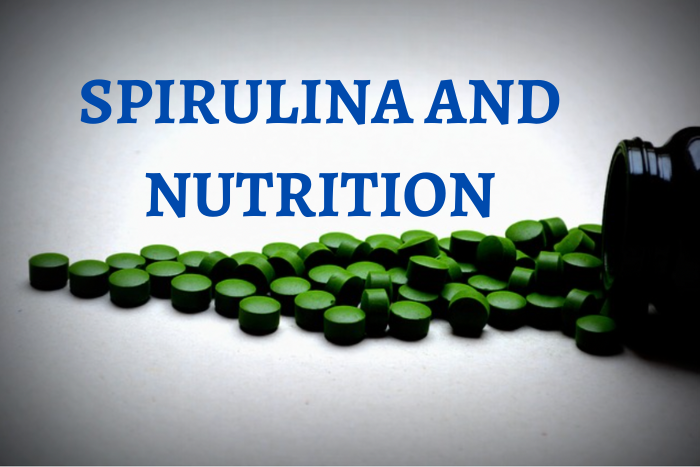
Spirulina and nutrition have close relationships. Why? Proper nutrition is the key to wellness, growth, development, and joy. Spirulina is a 21st-century food. These blue-green algae contain vital enzymes, vitamins, minerals, proteins, and amino acids.
According to the book Spirulina in Human Nutrition and Health, Spirulina is a high-nutraceutical phenomenon.
You would ask, what is nutraceutical?
Nutraceutical means food that has suitable additives and healing abilities. It implies that Spirulina is an excellent choice for those who want to be healthy and in good shape.
Spirulina consists of proteins, balanced fatty acids, vitamins, and minerals. Spirulina is food that helps tackle diabetes, anemia, cancer, arthritis, and more health problems.
Spirulina and nutrition
According to Wikipedia, nutrition is a science that interprets the interaction of nutrients and other substances in food for an organism’s maintenance, growth, reproduction, health, and disease.
Spirulina is easily digestible food and rich in nutrients. For example, one tablespoon a day can relieve iron anemia. Iron anemia is a common mineral deficiency.
When soil is depleted, animals and birds, the food source for humans, are fed up with substances lacking nutrients and full of chemicals; humans do not get enough nutrients from food. Spirulina is an excellent source of essentials for growth and development for people.
The role of fatty acids
Spirulina is rich in fatty acids. Fatty acids are the source of fuel. No fuel, no ride. The human body does not produce essential body acids. We must get fatty acids from food.
Two fatty acids are vital for humans: an omega-3 fatty acid( alpha-linolenic) and an omega-6 fatty acid( linoleic acid).
Primarily fatty acids serve multiple functions in the human body.
Fatty acids play a significant role in treating depression, inflammation, and metabolic processes.
In the book, Spirulina in Human Nutrition and Health authors emphasize the antimicrobial activity of Spirulina. Linolenic and linoleic acids have therapeutic value in cardiovascular diseases, menstrual disorders, skin diseases, hypercholesterolemia, and other disorders.
The human body produces GLA (gamma-linolenic acid) from linoleic acid (omega-6 fatty acid). GLA is found in primrose oil, edible hemp seeds, and spirulina. GLA ( gamma-linolenic acid) plays a role in antimicrobial activity.
Vitamins
Spirulina supplies are rich in vitamins such as A, B-complex, beta C, D, and E.
Beta-carotene or provitamin A
Vitamin A helps maintain mucous membranes and pigments necessary for good vision.
According to Robert Hendrikson, author of Earth Food Spirulina, carotene reduces the risks of cancers. Environmental issues and poor nutrition can be triggers for cancer. Beta carotene can reduce risks.
B-complex vitamins
Spirulina contains more B vitamins than beef liver, sea vegetables, or chlorella.
Minerals
Spirulina contains iron, a mineral that is vital for human bodies. Without iron, anemia can occur. People who suffer from anemia experience dizziness, ringing in the ears, lack of stamina, and loss of color in the face. There are heart palpitations and shortness of breath.
Iron is part of hemoglobin, a protein molecule in red blood cells. Red blood cells transport oxygen from the lungs to tissues and organs of the human body.
When anemia occurs, oxygen levels decrease, and people become tired quickly.
Spirulina is a great iron supplement because the absorption percentage of iron is 60% higher than other iron supplements, such as iron sulfate.
Spirulina contains minerals such as calcium, magnesium, sodium, potassium, phosphorus, zinc, manganese, copper, and chromium.
Chlorophyll
Spirulina contains significant amounts of chlorophyll. Chlorophyll is known as a cleansing agent. Chlorophyll can bind toxic metals and help the liver to rid of them.
Chlorophyll has the effect of curing inflammation of the mucous membranes. Gastritis and gastric ulcers are eased with the support of Spirulina.
Enzymes
Enzymes are biochemical catalysts. They influence the reaction in the body, such as quenching free radicals. As you know, free radicals increase metals’ aging and corrosion. Free radicals damage cells and proteins in the body.
It means Spirulina contains enzymes that prevent the body from being damaged by free radicals.
Conclusion
Spirulina is a stable source of vitamins, minerals, proteins, and enzymes. Spirulina is easily digested, without side effects nutritious supplement. The correlation between Spirulina and nutrition is enormous.
Spirulina is a healthy nutraceutical food and a reliable supply of vital nutrients.